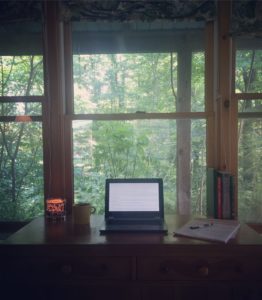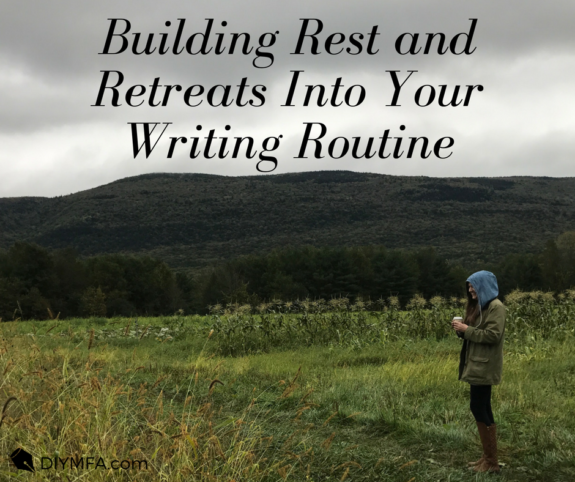I’m a huge fan of writing retreats. I’ve attended the Highlights Foundation Unworkshop four times this year, and am headed back in November. I am a big believer in the magic of uninterrupted blocks of writing time, especially if you have a hectic day job.
I recently went on a trip to Manchester, Vermont, where the leaves were changing, the air was crisp, and I got to ride a horse for the first time in years. I went with a friend who also happens to be a writer. We’ve gone on writing retreats together in the past. When we were planning our excursion, we had a discussion about whether or not to treat this trip as a writing retreat. We decided not to. In fact, we made a conscious decision to forgo writing for a few days, and focus on just being. Slowing down. Enjoying the moment.
Spoiler alert: it was amazing. But taking an actual vacation for the first time in years made me realize something–rest is good for my writing. Taking a break is good for my writing. Filling the well is good for my writing. And it’s also good for, well, me. This may seem obvious, but it’s a hard truth for me to put into practice. I’m guessing it is for other writers as well.
Perpetually Plugged In
Writing is an all-encompassing occupation. In some sense, writers are never not writing in some form or fashion. When we’re not actually at our desks, our minds are still percolating, still filing away, still working on our stories. Inspiration can come at a moment’s notice. Most writers I know at the least have a notes app on their phones, or a notebook and pen handy. And because most of us write on top of social obligations, jobs and other hobbies, we’re fitting writing in at odd times, waking up early or staying up late.
This is true of many jobs now, too. With smartphones and email, we can be working essentially around the clock. We never really “turn off.” Social media–especially if we’re trying to use it to build a platform–can exacerbate this. We’re never really at rest. And it eeks away at our ability to concentrate. I recently read an article that postulates that attention–the ability to concentrate on one task for an extended period of time–is becoming a competitive asset. The benefits of it are well-documented, but it’s a skill that–thanks to smart phones–fewer and fewer people are capable of cultivating.
One of the reasons I think I love writing retreats is because they allow me to truly unplug, something I don’t do in my day to day life. I’m able to sink into that deep work space and concentrate for hours. It’s invigorating and encouraging, rather than draining.
I’ve recently been trying to find ways to build these habits–rest, and intense concentration–into my daily, weekly and monthly routines. Here are a few things that have worked particularly well.
1) Create an Un-Plugged Space
 One piece of advice I see quite often is scheduling time away from social media, the internet or email. In some ways, this is good advice. It means we’re scheduling concentrated time, whether we’re using it for writing, reading, entertainment or work. However, it also assumes that our default state is to be online, to be connected, to be responsive to everything from emails and text messages to Facebook notifications and Twitter updates.This is a recipe for stress, scattered thinking and reactiveness. We’re not members of the Borg. We’re humans. And, maybe, rather than letting information come to us, we should be the ones who come to it, when we’re in a state of mind to consume it.
One piece of advice I see quite often is scheduling time away from social media, the internet or email. In some ways, this is good advice. It means we’re scheduling concentrated time, whether we’re using it for writing, reading, entertainment or work. However, it also assumes that our default state is to be online, to be connected, to be responsive to everything from emails and text messages to Facebook notifications and Twitter updates.This is a recipe for stress, scattered thinking and reactiveness. We’re not members of the Borg. We’re humans. And, maybe, rather than letting information come to us, we should be the ones who come to it, when we’re in a state of mind to consume it.
Think about it: when I open a book, I am making a conscious decision to interact with a certain author, a certain set of characters, and a certain type of story. I know what I’m getting into. Likewise, when I open a document on my computer to start writing, I know that I’m entering a certain type of work. I’ve signed up for it. But when I log onto Twitter, Facebook, Instagram, even email, I’m choosing to let other people create content that can influence everything from my mood to the next product I buy. I’m stepping into a flow of information I cannot control. Is that really where I want to spend the majority of my time?
It isn’t. But of course, during the work day most of us need to stay connected. But there is one thing that I’ve found that really helps with building in a habit of rest and retreat into my day: I made my room a no-internet zone.
Just the simple act of deciding that I was going to not check my phone or have the internet on in my bedroom makes walking into it an immediate relief. This is a place where I can read, write or just relax without having to worry about what’s in my inbox. Of course, there’s going to sometimes be times when I can’t stick to this rule, but for the most part, it’s hard and fast. It makes my room a place of rest and retreat. It’s almost like when I come home, I go into vacation mode. Or, at the very least, I’ve unplugged.
2) Maximize the Morning
Not everyone is a morning person– it’s definitely not my default. But the morning is the ideal time to carve out rest and retreat time in the day. It’s time I’m in command of, before the workday and other people start making demands on my time and attention. Until recently, I’ve filled every minute of my morning, so that it’s as productive as possible. My phone is off, my alarm is set, and the minute I get out of bed every second is precious. That’s my writing time, and nothing messes with it.
But I’m now trying to build rest into my morning, as well as intense concentration. I have found carving out even just fifteen minutes to do something restorative — whether it’s a quick yoga video, meditating or praying, reading a book or just staring out the window — can make my whole day feel a little less hectic. Building this type of rest into my day as well –whether it’s a walk around the block, or sitting on a park bench reading for twenty minutes at lunch–makes a huge difference.
3) Prioritize an Evening Routine
Another key to building rest into our days is, of course, actual rest. As in sleeping. While of course we’re all getting some amount of sleep (hey zombies!), we might not be setting ourselves up for the best night’s sleep by checking our phones, Netflix-binging, or even writing in the hour before bed.
I used to write right up until I crashed. But now, I’m trying to set aside half an hour to an hour to just sit and read before bed. I use a soft lamp. I’m in my room, so my phone’s off, and I dedicate that time to winding down. Sometimes a cup of tea helps 🙂 I sleep better and I’m ready to write come the morning.
4) Plan for Days Off
Writing is work, but it’s also fun work, and it’s work most of us are doing on top of jobs and other obligations. So, it often gets left to the weekend. This, in turn, means no weekend. I don’t know about you, but I’ve definitely had months where I look up and realize that, between writing and work, I haven’t taken a single day off. It’s easy to do, but the cost is high. Even with little breaks during the day, we need to take extended time off to be productive and happy.
Take a look at your calendar, and make sure that you’ve scheduled at least a few days off–really off, as in no writing or work off–a month. Go for a hike. Spend a day with a friend. I’ve even planned reading days. That time away from the computer will help you be more productive when you return to it.
On the other hand, you can also schedule mini-writing retreats. Even if it’s just for half a day at a coffee shop, building in intensive writing time will help build those concentration muscles. Then, when you only have an hour or half an hour to write, you’re ready to dive in and be fully present.
What about you? Do you schedule rest and retreats into your writing life? If so, what are your tips and tricks?








